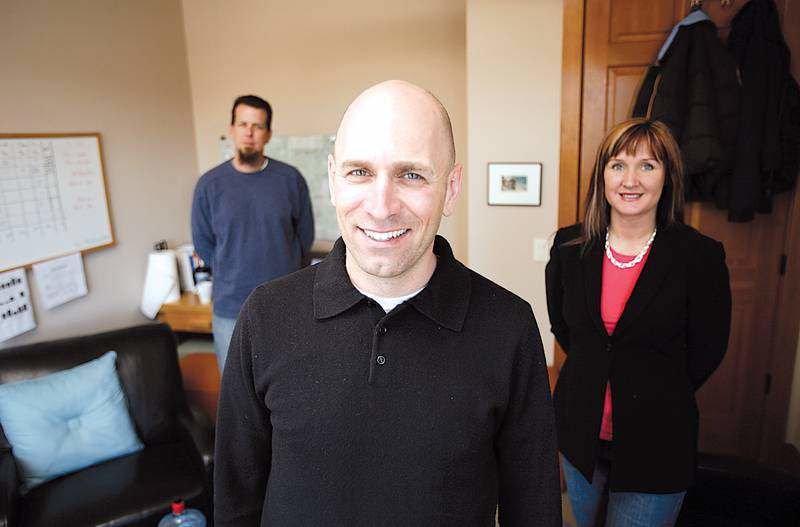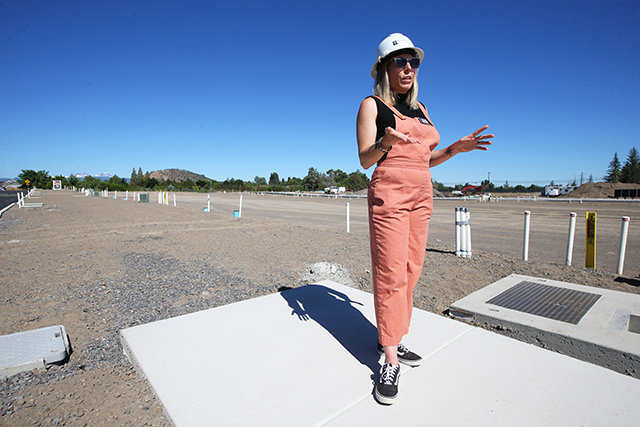Health care’s matchmaker
Published 5:00 am Monday, April 14, 2008

- Lloyd Fassett, center, stands in the northwest Bend office of his startup staffing company, Azteria, with two of his employees, Dan Sein and Kimberly Kerney-Davis. Fassett’s company uses the Internet to pair hospitals and clinics with eligible health care professionals most likely to fill needed job vacancies.
From a 153-square-foot office in Bend’s NorthWest Crossing, entrepreneur Lloyd Fassett is hoping to capitalize on the nation’s shortage of nurses.
Fassett’s recently launched Internet company, Azteria, helps hospitals and clinics find nurses and other health care professionals to fill their positions — but with a twist. Fassett’s idea was to create an index of available health care jobs and then use software to match jobs with prospective employees in a “real-time, supply-and-demand” environment, he said.
Trending
Using software to catalog available health care jobs that have been posted online, Fassett’s software next assigns to health care professionals who have registered with Azteria a score of 1 to 100, based on several criteria, including location, work type, specialty and shift, which ranks the probability that an applicant would fit the job’s requirements.
The end result is a virtual clearinghouse that finds the best match for both employers and prospective employees, eliminating armies of recruiters and inefficient job advertising online and off, Fassett said.
“Google is known for ordering the world’s information. We are organizing all of health care’s,” he said.
Fassett’s company is an Internet startup, and it looks the part. Fassett, 41, shares his office — he calls it “the lounge” — with two employees. They sit at desks; Fassett sits in a lounge chair. There’s a whiteboard on the wall tallying call statistics and a map of the Phil’s Trail mountain biking system just a few miles west of the office.
Currently, Azteria’s market niche is the travel nurse segment. Travel nurses are nurses who leverage the nation’s nursing shortage in order to live and work in different parts of the country, Fassett said. They often sign short-term contracts, sometimes for just a few months, and then move on to see another part of the country.
According to www.pan travelers.org, the Web site of the Professional Association of Nurse Travelers, there are an estimated 25,000 travel nurses in the U.S. That represents just 1 percent of the nursing market, said Fassett, but it’s a sliver worth $4 billion.
Trending
Fassett plans to expand into other health care fields besides nursing. The key, he said, is to work with pro- fessionals who are licensed by a state or other regulatory agency.
“The presence of a license and the Internet changes the economics of the staffing model, and no one has harnessed that yet,” he said.
Fassett said his company also is unique in that it puts employers and prospective employees on the same Web page. In other words, both types of users can see who is looking for work or looking for workers. The catch is that employers can’t see contact information for prospective employees. Instead, they contract with Azteria to fill their open positions.
Fassett’s staffers then use the company’s database to find the health care professionals who are best suited to fill the clients’ job needs. The Azteria database lists the best candidates at the top of the list, and Fassett’s staffers start calling from the top, working their way down until the position is filled.
“(The system) allows for automation, but we don’t take humans out of the equation,” Fassett said. “We make them more effective.”
Fassett allows health care workers to register on the site for free, and they only need to fill out a quick profile, he said. Health care workers can peruse the site’s job postings for free and even apply directly for the listed jobs without cost, Fassett said. Their profiles remain, however, and Fassett can tap them the next time a relevant job comes up.
Fassett said he can’t disclose the number of health care professionals who have registered with his company, but he says there are roughly 300,000 licensed health care employers in Azteria’s database.
“Advertising, job boards, agencies — nothing’s working,” Fassett said. “There are people to find, but what is the cost to get enough eyeballs on (an ad) to fill the job? The costs are too great. This is beyond advertising.”
Local entrepreneur Jeff Coffey, who has experience creating and running a software-based business, said Fassett’s idea is viable. Coffey is not involved with Fassett’s company, but he has talked with Fassett about it on several occasions, he said.
“I like seeing how can we leverage technology and touch, the database factor and the people factor … and I think he’s got a good approach to pairing technology with people,” Coffey said. “People put technical stuff out there that they think everyone will want to use, but they don’t often interface with it well — so I think (Fassett) has the right balance there.”
Fassett is not a nurse. He has a background in technology.
After earning a bachelor’s degree in business history from the University of Southern California and a Master of Business Administration from Cornell University, Fassett went to work for several dot-coms in Silicon Valley, he said. When the dot-com boom went bust, Fassett took a position with a health care staffing company in Long Beach, Calif.
Fassett said when he arrived at the company, the staffing specialists there would take calls from health care professionals looking for jobs and then work to place them, using an atlas and an index of all the country’s health care facilities, which they would cross-reference to find jobs for the company’s clients.
Four years ago, Fassett left and went to work on a better way to match health care jobs. He moved to Bend a year ago, convinced it’s a quality place to raise his four children and a fertile place to find investors and employees. A month ago, he hired his first two employees, and he expects he’ll hire more in the coming months, each of whom can make up to $100,000 a year in salary and commissions, he said.
“We are reinventing the staffing world,” Fassett said.
And the story behind the company’s name?
Azteria is a play on Azusa, Calif., a Southern California town commonly referenced as a contraction of “everything A to Z in the USA.” Azteria substitutes USA with a variation of the word terra, the Latin word for Earth.
If you go
What: Lloyd Fassett will discuss his business and court investors at Thursday’s PubTalk, a monthly business-themed social event organized by Economic Development for Central Oregon
When: Thursday, 5 to 7:30 p.m.
Where: McMenamins Old St. Francis School, in Father Luke’s Foundation Room
Cost: $15 for Economic Development for Central Oregon and Oregon Entrepreneurs Network members; $25 for the general public. Registration is required.
Contact: 388-3236








